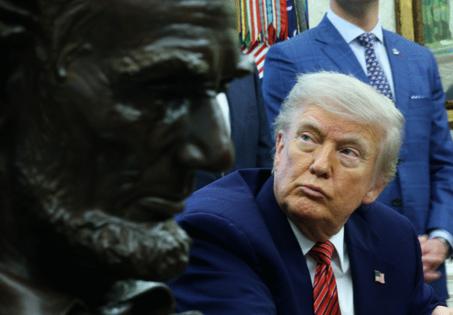Commentary: Four ways we can bring manufacturing jobs back to the American Heartland
Published in Op Eds
“Reindustrialize.” It’s the latest rallying cry gaining traction, with both the left and right calling for policy reforms to modernize American industry and finally bring back manufacturing jobs to the American heartland. But President Trump has been sounding this alarm for years, long before it became politically fashionable.
In line with this vision, the Trump administration has acted to revive manufacturing in the United States, and it’s worked with Congress to implement these policies through the One Big Beautiful Bill Act.
Here are 4 reforms in OBBBA that will help achieve reindustrialization:
Permanent Full Expensing
OBBBA permanently extends several pro-growth provisions of the 2017 Tax Cuts and Jobs Act (TCJA).
First, it permanently establishes 100% bonus depreciation, a provision that allows businesses to immediately deduct the total cost of qualifying capital investments, including most manufacturing machinery and equipment. While the TCJA had temporarily expanded this policy, OBBBA permanently locks it in, providing tax certainty for long-term investment.
Without this provision, business costs to replace old equipment or expand operations would be taxed as if they were profits to shareholders—even before they actually produce any profits. But with the provision, OBBBA eliminates the penalty on capital-intensive investment, encouraging domestic manufacturers to invest in new equipment and expand production capacity.
OBBBA also permanently establishes full and immediate expensing for research and development costs. Since 2022, domestic R&D costs have been forced to be amortized over 5 years—which allows inflation to erode the deduction’s value, thereby penalizing innovative pursuits.
By promoting permanent full expensing for R&D, OBBBA encourages domestic investment and manufacturing, providing tax certainty and removing upfront tax penalties on innovation.
Full Expensing for Factories and Other Goods-Producing Structures
OBBBA also enacts another key tax code reform: allowing businesses to immediately deduct the cost of constructing new factories and structures that produce or refine American-made goods.
Under prior law, these costs were recovered over a depreciation schedule of up to 39 years, a complex and burdensome process that penalized long-term domestic investment. But the new provision adds on to the deductions for equipment and R&D to ensure that there are no direct tax penalties on building new factories in America.
Permitting Reform
OBBBA also takes a step in the right direction to reduce bureaucratic delays in the permitting required to build factories. Specifically, it reforms the National Environmental Policy Act (NEPA), adapting it so that project developers can obtain expedited environmental reviews by paying a fee of 125% of the estimated cost of such a review.
This reduces one of many outdated roadblocks on the path toward building new factories and industrializing America. And by streamlining the NEPA permitting process, OBBBA also accelerates the construction of mines, oil and gas wells, and power plants that produce cheap and reliable energy required for reindustrialization.
529 Expansion for Apprenticeships
Finally, OBBBA increases the likelihood that firms will find highly skilled workers to operate machinery and equipment—a necessary step that’s often overlooked.
Rather than following the left’s playbook of importing foreign workers to meet these needs, OBBBA expands 529 educational savings accounts to cover costs associated with a broader range of apprenticeship programs and trade training and licensing. These apprenticeships are often better suited than most university programs to train young Americans for high-demand, high-paying jobs that will strengthen domestic production capabilities.
These reforms are promising, but OBBBA isn’t the end. Rather, the Trump administration continues to make meaningful reforms to boost domestic manufacturing by further rolling back regulations and fixing America’s outdated tax system.
Together, these reforms lay the foundation for a new era of American reindustrialization.
____
Richard Stern is Acting Director of the Roe Institute for Economic Policy Studies at the Heritage Foundation. Ethan Xu is a member of Heritage’s Young Leadership Program.
_____
©2025 Tribune Content Agency, LLC.
























































Comments